Guyanese Beverages: Basic Overview
Common Ingredients
Common Preparing Methods
Key Taste
Drinking Etiquette
Culinary Festivals
Influence and Fusion
Classifications of Guyanese Beverages
-
Alcoholic
Guyanese alcoholic beverages include rum and indigenous liquor, with molasses and cassava as popular ingredients.
These beverages can originate in the indigenous culture or were introduced from the outside world.
Their alcohol content can be significant
Some Guyanese beverages are gluten-free, depending on the ingredients.
-
Non-Alcoholic
Guyanese non-alcoholic beverages include herbal tea, soft drinks, and fruit juices.
Local ingredients, like fruits and herbs, are their main components.
These beverages can be served hot or cold.
Certain non-alcoholic beverages are widely available at Guyanese street stalls.
Guyanese beverages refer to both alcoholic and non-alcoholic drinks in Guyana, a country in South America. These beverages have diverse flavor profiles and make excellent accompaniments for local dishes.
Guyanese beverages are mostly made from local ingredients, such as fruits, molasses, and herbs. Many options originated in the indigenous tribes, while Europeans introduced the others.
Rum is an immensely popular alcoholic beverage in Guyana, demonstrating the solid culinary link between this country and the Caribbean. For non-alcoholic choices, Guyanese people go for mauby, a popular soft drink.
First, let’s delve into Guyana’s traditional drinking culture and the global popularity of local beverages. Next, I will talk about the 10 best beverages in Guyana.
For each Guyanese beverage mentioned in this compilation, I will mention its origin, main ingredients, preparation techniques, and, of course, ideal food pairing recommendations. Lastly, I will offer an overview of beverages in Guyana.
10 Famous Guyanese Beverages
To enjoy the greatness of Guyanese beverages, you should learn about the 10 most well-known choices in the country. I have included interactive filters to help you navigate this content more easily in terms of popularity, ingredients, tastes, and preparation methods.
Also, check out other filters based on traditional, national, and exotic beverage labels.
El Dorado Rum
- Alcoholic
- National
- Traditional
El Dorado Rum is a Guyanese spirit crafted by Demerara Distillers, once the country’s second-largest rum producer. It is made from molasses and aged in oak barrels.
As rum is among the most popular alcoholic beverages in Guyana, El Dorado Rum boasts a widespread appeal. Its alcohol by volume (ABV) is approximately 40%.
El Dorado Rum possesses an aromatic profile. Locals often serve El Dorado rum neat, over ice, or as a cocktail component.
The rich flavors of many traditional Guyanese dishes can stand up to the strong, complex notes of aged El Dorado Rum, such as Guyanese pepperpot and souse.
Banks Beer
- Alcoholic
- Traditional
Banks Beer is a Guyanese beer appreciated in many regions, from the Caribbean to the UK and the United States.
The golden brew of Banks Beer comes from malted barley and hops, but it sometimes features Styrian Goldings hops for a mild metallic and faint citrus hoppy bite.
A touch of straw-like taste usually complements the light sweetness of this beer. Dishes like fish cakes, cook-up rice, or fried bakes are excellent for complementing this flavor profile.
Mauby
- Non-Alcoholic
- Exotic
- National
- Traditional
Mauby is a famous soft drink in Guyana, though it is also popular in many Caribbean countries. Arguably the most famous non-alcoholic beverage in Guyana, it is made from the bark of the tree of the same name.
Sugar and mauby tree bark are boiled together to create a brown liquid to make Mauby. Traditional Mauby was fermented, but today’s commercial versions favor boiling the ingredients.
Mauby offers a sweet taste similar to root beer, but its aftertaste is slightly bitter. This unique flavor goes well with sweet treats like black cakes, custard blocks, and pine tarts.
Ginger Beer
- Non-Alcoholic
- Traditional
Ginger beer is a well-known non-alcoholic beverage in Guyana. First brewed in England, it was introduced to this South American country during colonial times.
The main ingredients of ginger beer are zesty ginger root, brown sugar, and yeast for fermenting the mixture. The result is a bold, refreshing beverage that pairs well with pine tarts, mithai, and black cakes.
In Guyana, ginger beer is trendy during Christmas. The local version sometimes has a dash of champagne yeast for a spirited, alcoholic variant.
Sorrel
- Non-Alcoholic
- Traditional
Sorrel, also known as hibiscus tea, is a well-known beverage in Guyana. Locals prepare it from hibiscus flowers and spices.
While many Caribbean countries enjoy sorrel, the Guyanese version is distinct in some ways. For example, this beverage calls for only cloves and cinnamon and can be prepared with fresh sorrel blossoms.
Sorrel is one of the most beloved non-alcoholic beverages for Christmas, so Christmas staples like black cakes, Guyanese pepperpot, and carne de vinha d’alhos are natural accompaniments.
Peanut Punch
- Non-Alcoholic
- Traditional
Peanut punch is a Guyanese alcohol-free beverage similar to a milkshake. It combines peanut butter, milk, spices, and optional fruits (like bananas) into a thick and creamy drink with a bubbly profile.
Peanut punch is renowned for its rich protein and energy content. In Guyana and many Caribbean countries, street vendors usually sell peanut punch in glass bottles.
Such light dishes as pholouries, fried bakes, and cassava bread are excellent Guyanese dishes for accompanying peanut punch.
Kasiri
- Alcoholic
- Exotic
- Traditional
Kasiri, also known as kaschiri and cassava beer, is a Guyanese beer brewed from cassava. It has its roots in indigenous cuisine and is also well-known in several South American countries, especially Suriname and Brazil.
The process of making kasiri involves pressing grated cassava in a cylindrical basketwork press and fermenting the pulp.
Kasiri is sometimes used to make cassareep, a dark, viscous syrup that is a core ingredient of Guyanese pepperpot. Therefore, it is reasonable to pair these two together.
Parakari
- Alcoholic
- Exotic
- Traditional
Parakari is a Guyanese alcoholic beverage of indigenous origin. Deeply rooted in the customs of the Makushi tribe, parakari is an integral part of their vibrant culture.
People make parakari with cassava and ferment it with enzymes or saliva. Traditionally, the cassava is chewed to kickstart the dual fermenting process.
Afterward, the cassava is rinsed, drained, and turned into bread. Then, the bread is broken up and allowed to ferment again to create parakari.
Given the roots of parakari, this beverage should go with native dishes like Guyanese pepperpot, cassava bread, or farine.
Lemon Hart
- Alcoholic
- Traditional
Lemon Hart is a well-known rum from Guyana. It was named after an English businessman who contributed greatly to Caribbean rum and was once the rum supplier for the British Navy.
Made from molasses, Lemon Hart is an amber-colored rum with the unmistakable richness of molasses and the intriguing aroma of spices. Its intricate flavor is reminiscent of dry fruits, caramel, and bittersweet chocolate.
In terms of accompaniments, Lemon Hart works well with various kinds of dishes, like callaloo, metemgee, souse, and fish cakes.
Swank
- Non-Alcoholic
- Traditional
Swank, literally “full of life energy,” is a type of Guyanese lemonade. Locals often serve it alongside light dishes like cook-up rice, plantain chips, and egg balls.
The standard ingredients for swank are water, brown sugar, and lime juice. The use of brown sugar gives this sweet and tart beverage a pale chocolate-like color distinct from your regular lemonade.
Do you want to know more about Guyanese beverages? Read on to uncover helpful facts!
What Is Special About Beverages in Guyana?
To give you a picture of beverages in Guyana, I will cover the legal drinking age, drinking etiquette, and responsible drinking.
Drinking Age
You have to be 18 years old or older to purchase alcoholic beverages in Guyana.
Drinking Etiquette
Meals often begin with a drink and flavorful culinary creations in Guyana, with the host being the one who initiates it.
Rum is the most common alcoholic beverage in Guyana, and most people enjoy it with toast.
When enjoying Guyanee beverages with local food at a formal meal, remember to keep your wrists on the table but not your elbows.
Responsible Drinking
In general, Guyanese people are heavy alcohol consumers, and alcoholic beverages, especially rum, are widely served. However, you can always ask for non-alcoholic drinks.
Do you have more Guyanese beverages that can be added to this list? Don’t hesitate to show me in the comment section! And don’t forget to share this list with your friends.
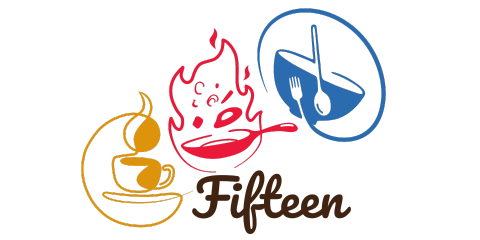


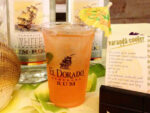
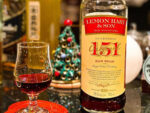
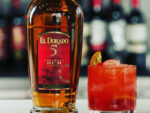
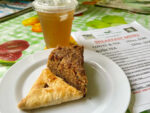
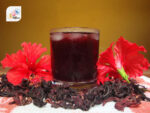
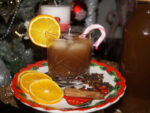
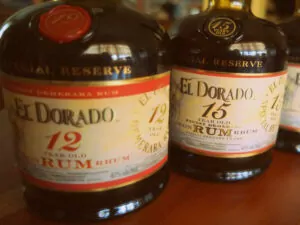

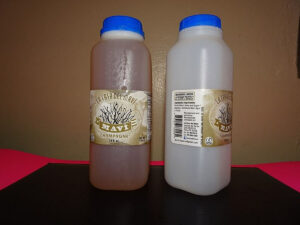
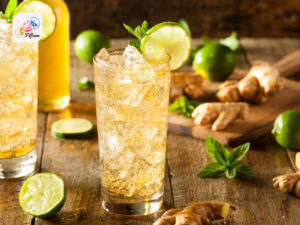
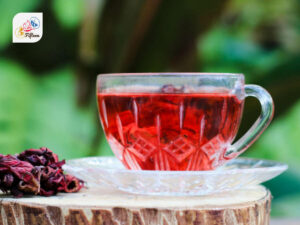
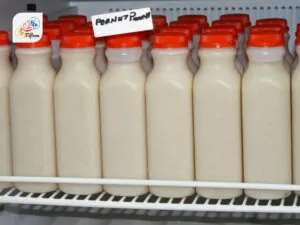
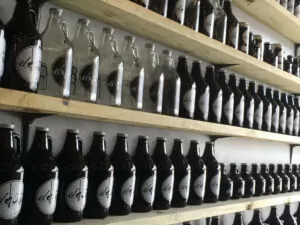
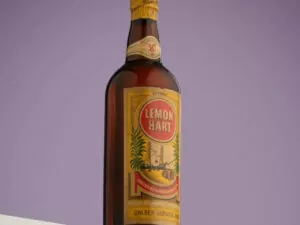
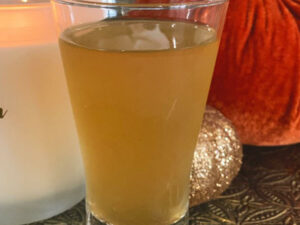
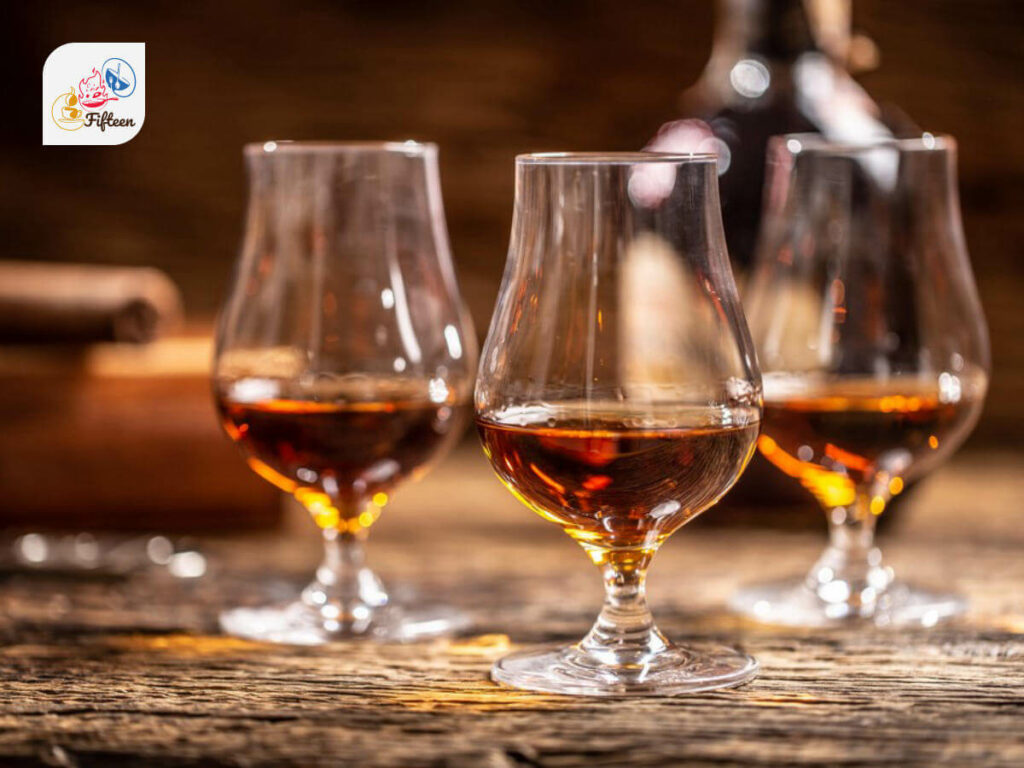
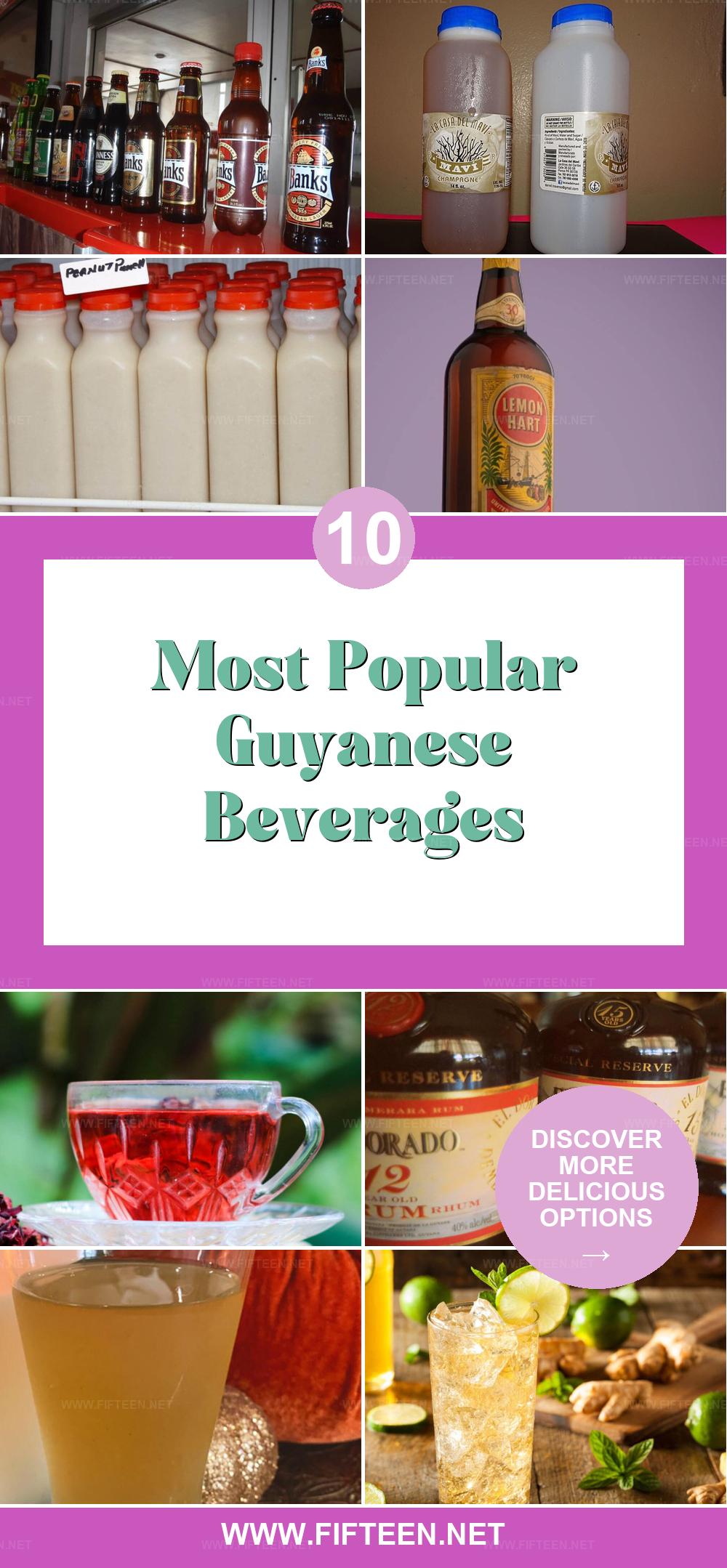
Jamie Scott
Editor in Chief, Senior Content Writer
Expertise
Home Cooking, Meal Planning, Recipe Development, Baking and Pastry, Food Editor, Cooking-video Maker, Western Food Evaluation Expert
Education
Le Cordon Bleu College of Culinary Arts
Local Community College, New York, NY
Jamie Scott is a skilled culinary expert and content creator specializing in Western cuisine. With over 15 years in the culinary field and formal training from Le Cordon Bleu, Paris, Jamie deeply understands how to blend nutrition with delicious flavors. His passion for cooking matches his commitment to making healthy eating accessible and enjoyable.
On Fifteen.net, Jamie brings a fresh perspective to classic dishes and beverages, offering readers insightful recipes, cooking tips, and a fresh view on meal planning that emphasizes taste, health, and simplicity.